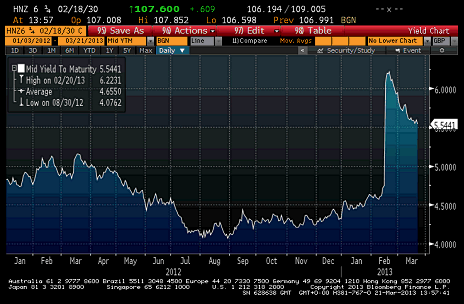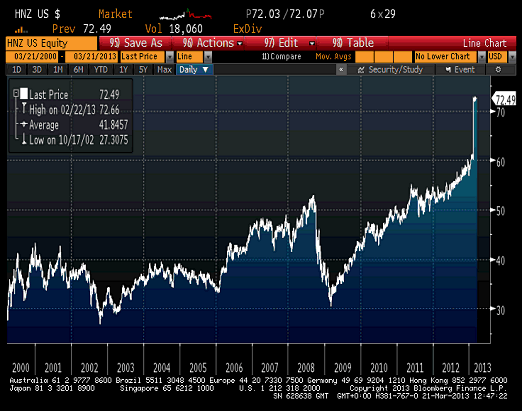Heinz: Beans, Buffett and the return of animal spirits
After years of inactivity, the combination of strong corporate balance sheets and cheap funding has sparked demand for takeover deals. The largest and highest profile deal this year has been the acquisition of H.J.Heinz by 3G Capital and Berkshire Hathaway. It is exactly the type of business that Berkshire Hathaway’s Chairman and CEO Warren Buffett typically goes for: profitable growth; a very recognisable brand; and years of emerging market growth forecast in the future.
Berkshire Hathaway and 3G Capital are buying Heinz for $72.50 per share, a 19 percent premium to the company’s previous record high stock price at the time the deal was announced in mid-February. Including debt assumption, the transaction was valued at $28 billion. Berkshire and 3G will each put up $4.4bn in equity for the deal along with $12.2bn in debt financing. Berkshire is also buying $8bn of preferred equity that pays 9%.
Let’s not beat around the bush. It’s a great company. The business has seen thirty one consecutive quarters of organic growth, stable EBITDA margins, owns a number of globally recognised brands and should be well positioned for future emerging market led growth. Despite this, some are questioning whether Buffett is overpaying for Heinz. So is the price of the deal justified?
The answer, at least in part, lies with cost of debt. The pro-forma capital structure (per the offering memorandum) looks like this:
| PF Capital Structure | Sources ($m) | Net Debt/PF EBITDA |
| Cash | -1,250 | |
| 1st Lien | 10,500 | 3.87 x |
| 2nd Lien | 2,100 | 4.75 x |
| Rollover Notes | 868 | 5.11 x |
| Total debt | 12,218 | 5.11 x |
| Preferred Equity | 8,000 | 8.46 x |
| Common Equity | 8,240 | |
| Total | 28,458 |
Current price talk on the first lien debt sits at $ Libor + 2.75% (floored at 1%) with the second lien at 4.5%. If this is finalised, the company will see an approximate blended interest cost of 3.9% on its new debt securities. Prior to the transaction, Heinz was rated as a solid investment grade business attracting a Baa2/BBB+ rating. Assuming the deal goes through, its new second lien notes are expected to be rated B1/BB-, some five notches lower than Heinz’s current rating, reflecting the much higher financial leverage and structural subordination.
It’s worth noting that through last year Heinz’s 6.25% 2030 bonds traded in a range of 4–5%, despite the much higher rating and lower financial leverage at the time; albeit some term premium is warranted given the longer dated nature of the debt. The bonds have since sold off in recognition of the greater risk – as things stand they will remain in place.
Now let’s compare the price action of the proposed debt financing to the preferred equity to be owned by Berkshire Hathaway. Whilst the paper is structurally subordinate to all other debt, it still sits ahead of some $8,240bn of common equity and attracts a cash coupon (which can be deferred) of 9% vs the 3.9% weighted average above. It’s also worth bearing in mind that the transaction has been structured to encourage the preferred equity to be retired, at least in part, ahead of both the first and second lien debt, potentially leaving bondholders with significantly less subordination than at day one. I’d argue that this is by far the most attractive (quasi) debt to invest in within the structure, though that is hardly surprising given that unlike Buffett, few of us can write a cheque of this magnitude.
As animal spirits return and the leveraged finance community falls over itself to lend to well known companies, the likely winners in the space will be the private equity community. Whilst we are nowhere near the levels of the great private equity binge of 2004-07, the value of takeovers in 2013 is already running well ahead of 2012. After years of corporate deleveraging, we may now be entering into a period of increased M&A activity. Company managers may find that if they aren’t willing to start leveraging up given the environment of extremely low borrowing costs, then investors like Buffett will do it for them.
The Heinz deal has been another recent shot across the bows of the bond market. Rising leverage has a longer term implication for credit markets, in that it is bad for credit quality. Bigger and bigger companies are clearly in play and this is something we will be keeping a very close eye on.
The value of investments will fluctuate, which will cause prices to fall as well as rise and you may not get back the original amount you invested. Past performance is not a guide to future performance.












